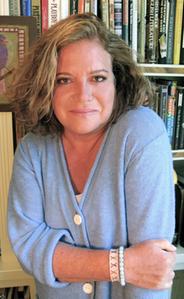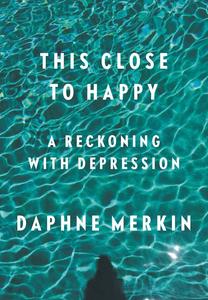
|
|
| photo: Tina Turnbow | |
There are few things more under-discussed, while simultaneously increasing in frequency, than depression. While standards of measurement are debated, there is mounting evidence that its prevalence is increasing.This has also led to more narratives about depression, including This Close to Happy: A Reckoning with Depression by Daphne Merkin (just published by Farrar, Straus & Giroux). Merkin is a former staff writer for the New Yorker and a contributor to ELLE. Her writing frequently appears in the New York Times, Bookforum, Departures other publications. Her previous books include the novel Enchantment and two collections of essays, Dreaming of Hitler and The Fame Lunches. She lives in New York City.
There's a sense in this book of a safari, taking a boat up tributaries of a river, finding the sources, mapping it out. Do you feel closer to having a "map" of how depression comes together for you?
I don't know if I feel closer to having a "map" of depression, if only because depression is so elusive an animal, but I do feel closer to being able to navigate its landscape when it arrives. I think it's important to keep an eye on the light at the end of the tunnel--which, hopefully, is not the light of the oncoming train, as Robert Lowell once darkly quipped, but the light of a future where depression doesn't have so much sway. One of the intrinsic problems with depression is that in some way it always presents itself as "new," just when you think you've left it behind. So, it is important to keep an open mind, so to speak, about the possibility of its returning rather than imagining that it's gone for good. That doesn't mean walking around with one ear constantly bent to internal rumblings, but to be aware and conscious of the warning signals so as not to be caught totally off guard.
Many people seem to have ideas about living with depression that fall into two categories. The first is that one should remain as optimistic as possible and work toward a goal of "curing" depression. The other is that depression is simply "incurable," and that one's overall contentment can be increased by accepting it and working within those parameters. Do you feel drawn to the idea of possibly living depression-free at some point?
I think the whole point is to try to avoid these do-or-die scenarios about depression, because neither of them really apply--at least not for me. It's hard to give up on the hope of "curing" one's depression, although I think there are people for whom severe depression remits, never to return. I am definitely still captured by the idea of living free of depression, but experience has told me otherwise. If you have a predisposition to this illness, there are too many slings and arrows that can set it off, from minor scrapes to hard falls. At this point I work hard on keeping my depression at bay by whatever means possible--medication, therapy, friendship, negotiations with myself--and hope that it will slink away forever, without actually believing that it will. What books did you look to for inspiration, or comfort, in writing this book?
What books did you look to for inspiration, or comfort, in writing this book?
I always look to books for comfort, whatever I'm doing, so I'm not sure I looked to particular ones for inspiration or comfort while writing this book. I wanted it to be as readable as a good novel, so, to that end, I re-read some of my favorite novels, like Walker Percy's The Moviegoer, to make sure it had some narrative propulsion. I also read a lot of memoirs to see how the personal material was handled and to gather clues on how best to frame my own experience. I didn't particularly look at books about depression because I wanted to try to go my own way, without undue influence.
Tell us about your experiences in therapy: what has worked, what hasn't worked, what do you look for in a therapist? What have been your biggest challenges in finding support?
My experiences in therapy have been manifold and I do ultimately credit therapy with helping me get through the dark times. That said, I have had better and less good therapists. I think what's important for me is that the therapist in question doesn't get overwhelmed or scared off by the negative power of my depression. Depression is an isolating illness as it is, and it isn't useful for someone else to feel vanquished by it--especially someone you're looking to for support. That happened to me with one psychoanalyst who barely believed in medication but suddenly started espousing ECT (shock therapy) for me when my mood plunged. It seems to me that the biggest challenge is finding a therapist who doesn't underrate your depression but also has the vision to see beyond it on your behalf. A sustaining sense of humor is crucial as well.
There's still a lot of fear about ECT. I've seen dramatic results in a couple of people, and I've also worked with people on their fear of going anywhere near it. Did you feel that that therapist was turning to ECT out of a fear that they had underestimated your depression, or overestimated their ability to help you in other ways?
I recognize that ECT can really work--I personally know people who swear by its efficacy. And I haven't come to any permanent decision about it for myself, despite harboring fears of it--specifically the memory loss that comes in its wake. In my own situation, I did feel that my therapist was turning to ECT precisely out of a sense of fear--and, perhaps, a sense that he had miscalculated the beneficial effects of therapy. Perhaps had the possibility of ECT come up in a different way, I might have been more open to it. In some ways, the whole approach goes against my ideas about how identity is formed and the mind/brain division, but my ideas are undoubtedly arbitrary and unscientific in the extreme. --Matthew Tiffany, counselor, writer for Condalmo

